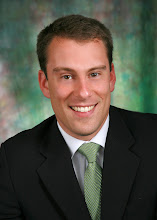 |
| Bob Neilson at my campaign kickoff in 2012 |
Bob grew up in Wahkiakum County, spent his career as an Army officer, including service in the Vietnam conflict, and he and his family made Puyallup their home in 1977. He was involved in Living Word Lutheran Church, the Puget Sound Honor Flight, and a number of local political campaigns.
I first heard of Bob in an email he sent me in 2004, offering me unsolicited but much-needed life advice and concluding with, “If you're in Puyallup I would be happy to buy you a cup of coffee so long as you drink it black and without artificial sweetener.” I was away at college in Michigan then, but I got to know Bob a few years later when he was president of the 25th District Republican Club. His regular club newsletter included his commentaries on culture, politics, and education. He made it his personal ambition to elect Republicans to all three legislative seats in the 25th District, something that had not been done since before the Great Depression.
In the summer of 2009 I was thinking of running for the legislature the following year, and I knew that I needed Bob’s support. So I joined him on his morning walk on the Foothills Trail one day and we discussed the idea. He had plenty of good advice.
In the spring of 2010, Bob decided to go door to door for Bruce Dammeier and me to drop off our flyers. Morning after morning, Bob was out on the main streets and back roads of the 25th District helping to drum up votes. He was joined by Jim Downs for much of the time. The day before the election, he wrapped up his work, writing to Bruce and me, “Did 179 homes for a total of 5135 since June 16. Jim and I started when it was warm, worked when it was hot and finished when it is cold and wet.”
I ended up winning that election by 29 votes out of 52,000 cast. There’s no question that Bob made the difference. Without him, I wouldn’t have won my first election.
Every day that Bob went out on the campaign trail, he’d send us an after-action report detailing his exploits. “Today was a royal butt kicker,” he wrote in June 2012. “Campaigned the NE corner of 25-221 and did 96 homes for a total of 427. Took me 2-1/2 hours because of mountainous terrain, long driveways, raging rivers … I crossed into another precinct as I walked back to my truck. Visited no more than five homes. We all know how important five homes can be. That is 16% of the margin Hans won by.”
In July, he wrote, “Today I started in 25-242. It is a butt kicker. Took me over two hours to visit 72 homes for a total of 1250. Lots of hills and long driveways. Feel myself getting into shape. This is where elections at this level are won. We are going where the saints dare not [trod].”
And Bob kept on going. I once invited Bob to attend a benefit breakfast for a local nonprofit. He wrote back that he could not attend because “I will be going door-to-door for you and Melanie. Besides I truly dislike events like this because they attract candidates for public office.”
He encountered various interesting characters, scenes, and dogs.
"Worked 25 - 244 again today," he wrote one day. "A lot of exercise. A lot of miles. Not a lot of homes. In two hours I visited 66 homes for a total of 1859....One home had every vicious dog in the world less two. The next home had them. Was not confident the steel gate would hold. They got in a fight with each other over who would get to devour me."
Bob was a master of retail politics. "Visited with one man today who confirmed what I know about elections at this level," he wrote. "Gentleman said to me, 'If you are interested enough to come to my home I will vote for you. I do not care what party you're from; I'll vote for you.' People want us to show interest in them. If we bust our backsides going door-to-door then we can have a Republican sweep of the 25th Legislative District."
And a sweep is just what happened in 2014, after Bob set a new record of doorsteps reached.
"It is fun and invigorating and an honor," he once wrote to us in the middle of a campaign.
This year we won’t have Bob out on the streets and neighborhoods of the 25th District going door to door for us, but I’m sure he’s hard at work on the streets of heaven. I can imagine him up there repeating from time to time the little phrase he wrote whenever he signed off his emails: "All is well."


